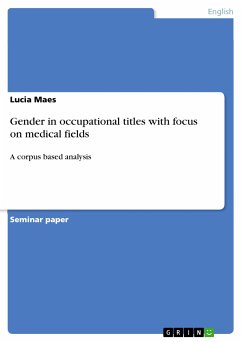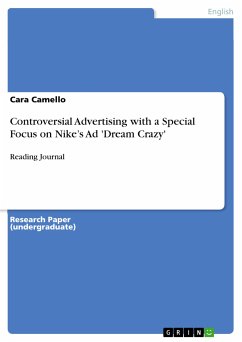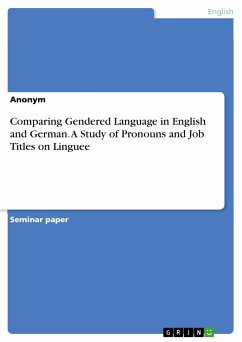Seminar paper from the year 2018 in the subject English Language and Literature Studies - Linguistics, grade: 1,7, Free University of Berlin (Institut für Englische Philologie), course: Levels of Linguistic Analysis II: Morphology, language: English, abstract: Different to many other languages in general the English language does not always show a distinction of gender in most nouns. If we talk about our "friend" the counterpart can not know the gender in question. Some nouns variate in the form or even the word according to whether they are female or male and of those distinct words even show gender neutral options. Just as "man" qualifies male and "woman" female sex the neutral option would be "person". The same phenomenon counts for "father", "mother" and their neutral variant "parent" as well as "boy" for male, "girl" for female their neutral option being "child". Another example provide "husband", "wife" and the gender neutral term "spouse". Those gender variations, however, are exceptional and the gender marking suffixes -ette, -ine, -enne, (as in actor/actress, hero/heroine) are only available for rare cases and - which is the crucial point and reason for the investigation being mentioned as follows - signalling women's secondary status as it is deviating from the male norm. This implies that if we want to properly gender without first and secondary status the two appropriate options would be either to not mark gender at all (e.g. "professor") or to put the gender markers "male" and "female" in front the implied noun. This paper investigates the incidence of the two aforenamed lexemes with focus on occupation titles from the medical field and their usage according to the authors' sex. Using the BNC I suspect the result being more female figures using the gender markings "male" and "female" and more men using no gender markings at all. In addition a connotation analysis is conducted with the aim to examine some general gender associations which accompany the occupational titles in question.
Dieser Download kann aus rechtlichen Gründen nur mit Rechnungsadresse in A, B, BG, CY, CZ, D, DK, EW, E, FIN, F, GR, HR, H, IRL, I, LT, L, LR, M, NL, PL, P, R, S, SLO, SK ausgeliefert werden.









